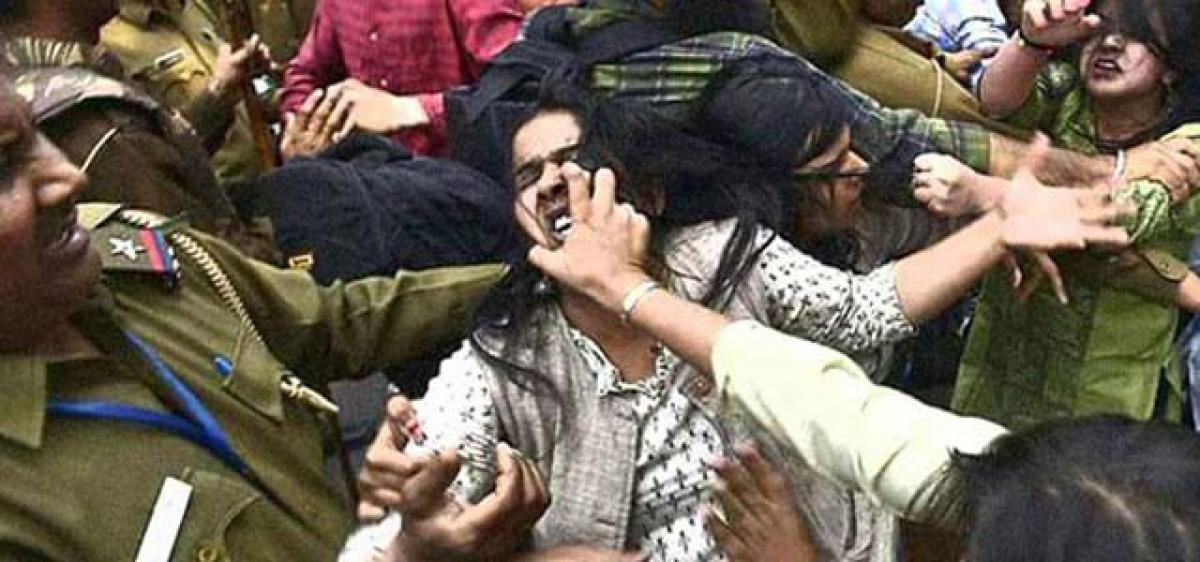Live
- Vizianagaram: ‘Looters, cheaters will be put behind bars’
- Jhansi says she will focus on holistic development of Vizag
- What Sam advocated
- Congress swings into damage control
- Pitroda's inheritance tax remarks fuel fresh attack
- Dharmavaram: A mastermind that played a spoilsport for TDP rivals
- KCR launches poll bus yatra
- Revanth dares KCR, Harish
- Modi frustrated, afraid of invisible voters: Kharge
- SC seeks clarification from EC on functioning of EVMs
Just In

Trolls have unleashed an online mafia attack on the daughter of a Kargil martyr, Gurmehar Kaur, for expressing her views on campus violence. The aggrieved party has every right to fiercely express their point of view.
Trolls have unleashed an online mafia attack on the daughter of a Kargil martyr, Gurmehar Kaur, for expressing her views on campus violence. The aggrieved party has every right to fiercely express their point of view.
But, abusive campaign and even threat of physical violence and rape to a daughter of someone who laid down his life for the cause of the nation is highly reprehensible. Notwithstanding the facts of the events in Delhi University College, such a social media onslaught is unbecoming of a democratic society.
It’s an extreme form of intolerance and has nothing to do with nationalism. Indian civilisation is known for its argumentative tradition. A mature democracy allows free flow of ideas. The trolls were emboldened by the irresponsible remarks of political bosses.
Those who advocate limits on free speech argue that the Indian Constitution is different from that of the First Amendment to the American Constitution and that the former does not allow any absolute right to free speech. But, neither the trolls nor their political patrons can arbitrarily decide on the fairness of free speech exercised.
The Supreme Court in Life Insurance Corporation v Manubhai D Shah held that free speech must be exercised in a manner in which it does not clash with the paramount interests of the state or the community at large. Any opinion expressed against the government or the party in power and its Pariwar cannot be construed as clash with the paramount interests of the state and the community at large. The government and the nation, the party and the society are not synonymous.
The apex court in Romesh Thappar v State of Madras (1950) held that freedom of speech lies at the foundation of all democratic societies. Free speech does not just promote democracy but is one of the defining ingredients of democracy itself.
In S Rangarajan v P Jagjivan Ram (1989), the Supreme Court stated in no uncertain terms that democracy is government by the people via open discussion. Public discussion is a basic feature and rational process of democracy, which distinguishes it from all other forms of government.
Gagging of public discourse just because the people in power find it distasteful is the antithesis of democracy. In the LIC case, the apex court said, “Freedom to air one’s view is the lifeline of any democratic institution. And any attempt to stifle, suffocate or gag this right would sound a death-knell to democracy and help usher in autocracy or dictatorship.”
In fact, in the event that there is a conflict between free speech and other values, the court in R Rajgopal v State of Tamil Nadu (1994) held in favour of free speech.
Freedom of speech would mean very little if it were not able to respond to political and social changes. This is not to advocate a right to subversive speech. But, expression of views against the government or the ruling party or its ideology does not tantamount to anti-national views.

© 2024 Hyderabad Media House Limited/The Hans India. All rights reserved. Powered by hocalwire.com







